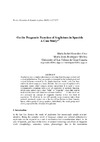Identificador persistente para citar o vincular este elemento:
https://accedacris.ulpgc.es/jspui/handle/10553/58718
| Campo DC | Valor | idioma |
|---|---|---|
| dc.contributor.author | González Cruz, María Isabel | en_US |
| dc.contributor.author | Rodríguez Medina, María Jesús | en_US |
| dc.date.accessioned | 2019-12-16T19:27:43Z | - |
| dc.date.available | 2019-12-16T19:27:43Z | - |
| dc.date.issued | 2011 | en_US |
| dc.identifier.issn | 0214-4808 | en_US |
| dc.identifier.other | Dialnet | |
| dc.identifier.uri | https://accedacris.ulpgc.es/handle/10553/58718 | - |
| dc.description.abstract | Anglicisms are a complex phenomenon resulting from language contact and cultural globalization. They are greatly encouraged by the technological and cultural influence exerted by the Anglo-American world. Little has been said so far about usage as a factor. Besides, there is a type of anglicism of a pragmatic nature which remains almost unexplored. It is used in some communicative situations with a sort of expressive or aesthetic function, which some authors have called “ludic” or “empathic”, since they tend to mark oral discourse with humorous or ironic features. In this article we will approach the concept of pragmatic function within this field of anglicisms. To illustrate it, we will provide some examples taken from research previously carried out in the city of Las Palmas de Gran Canaria, Spain, with a group of young speakers, undoubtedly the social group most overtly exposed to the influence of anglicisms. | en_US |
| dc.language | eng | en_US |
| dc.relation.ispartof | Revista alicantina de estudios ingleses | en_US |
| dc.source | Revista Alicantina de Estudios Ingleses: RAEI [ISSN 0214-4808] (24), p. 257-273 | en_US |
| dc.subject | 57 Lingüística | en_US |
| dc.title | On the pragmatic function of anglicisms in Spanish: a case study | en_US |
| dc.type | info:eu-repo/semantics/article | en_US |
| dc.type | Article | en_US |
| dc.identifier.url | http://dialnet.unirioja.es/servlet/articulo?codigo=3925926 | - |
| dc.description.lastpage | 273 | - |
| dc.identifier.issue | 24 | - |
| dc.description.firstpage | 257 | - |
| dc.investigacion | Artes y Humanidades | en_US |
| dc.type2 | Artículo | en_US |
| dc.contributor.authordialnetid | 173142 | - |
| dc.contributor.authordialnetid | 170379 | - |
| dc.identifier.dialnet | 3925926ARTREV | - |
| dc.identifier.ulpgc | Sí | es |
| dc.description.sellofecyt | Sello FECYT | |
| dc.description.erihplus | ERIH PLUS | |
| item.fulltext | Con texto completo | - |
| item.grantfulltext | open | - |
| crisitem.author.dept | GIR Estudios sociolingüísticos y socioculturales | - |
| crisitem.author.dept | Departamento de Filología Moderna, Traducción e Interpretación | - |
| crisitem.author.dept | GIR Estudios sociolingüísticos y socioculturales | - |
| crisitem.author.dept | Departamento de Filología Moderna, Traducción e Interpretación | - |
| crisitem.author.orcid | 0000-0002-6815-2743 | - |
| crisitem.author.orcid | 0000-0002-1928-8839 | - |
| crisitem.author.parentorg | Departamento de Filología Moderna, Traducción e Interpretación | - |
| crisitem.author.parentorg | Departamento de Filología Moderna, Traducción e Interpretación | - |
| crisitem.author.fullName | González Cruz, María Isabel | - |
| crisitem.author.fullName | Rodríguez Medina, María Jesús | - |
| Colección: | Artículos | |
Visitas
267
actualizado el 15-ene-2026
Descargas
147
actualizado el 15-ene-2026
Google ScholarTM
Verifica
Comparte
Exporta metadatos
Los elementos en ULPGC accedaCRIS están protegidos por derechos de autor con todos los derechos reservados, a menos que se indique lo contrario.
